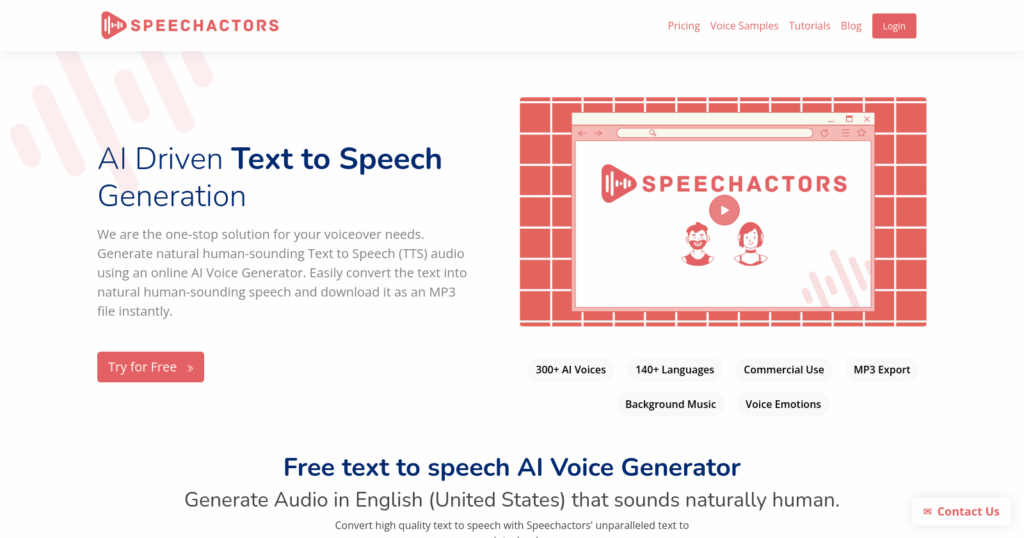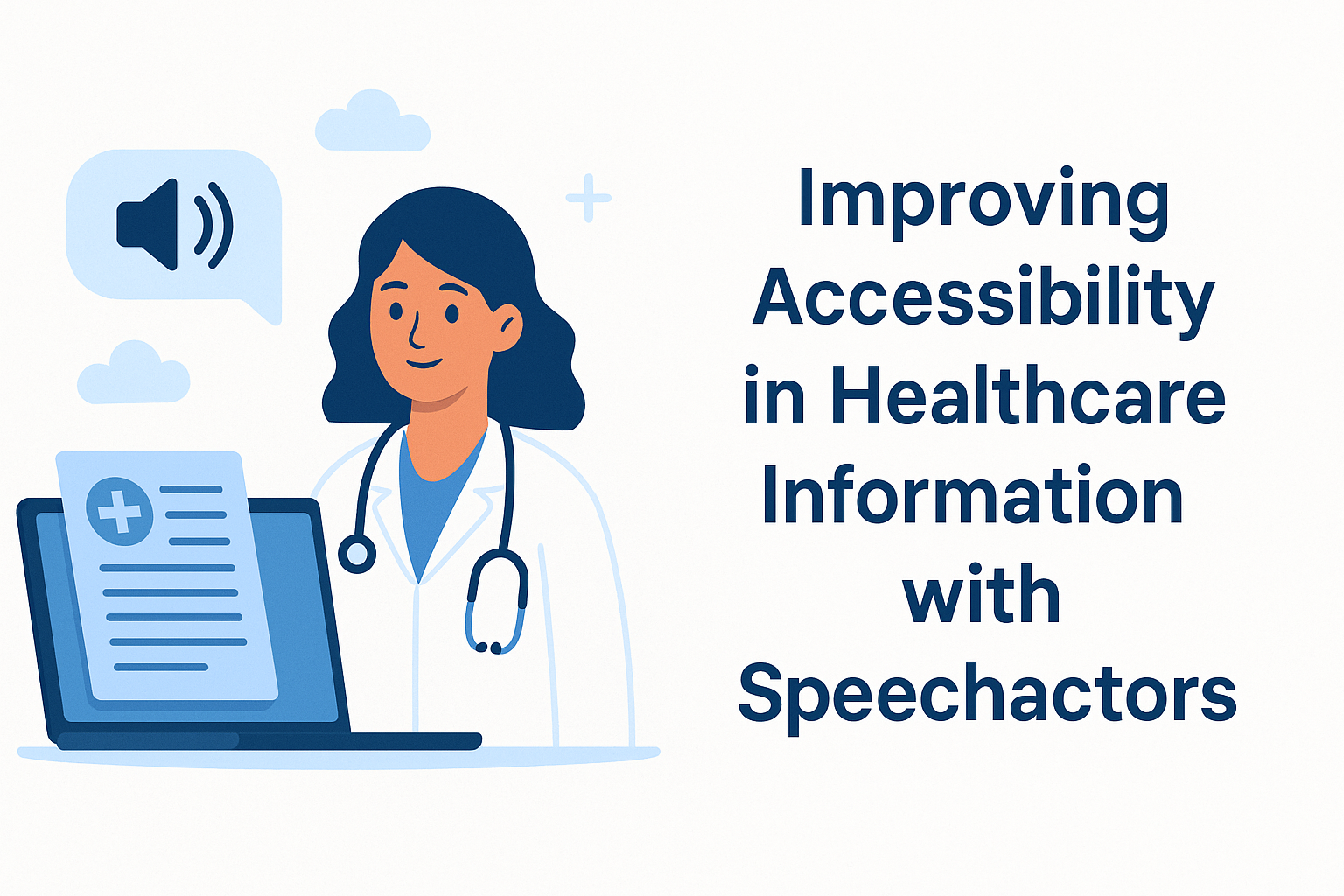Access to accurate and understandable healthcare information is crucial for patients and caregivers alike. Speechactors offers a revolutionary solution to improve accessibility by transforming text into clear, human-like speech.
This technology enhances the experience for those with visual impairments or reading difficulties, ensuring that important health details are easily accessible.
With Speechactors, healthcare providers can ensure their information reaches a wider audience, making medical knowledge more inclusive and accessible for everyone, regardless of their abilities.
The Importance of Accessibility in Healthcare Information
The Importance of Accessibility in Healthcare Information is that it ensures all individuals, regardless of ability, language, or literacy level, can understand and benefit from medical content.
Accessible healthcare information improves patient outcomes. Studies by the National Library of Medicine show that clear communication reduces hospital readmissions and enhances treatment adherence.
Accessibility includes formats like text-to-speech, subtitles, and multiple languages. The WHO reports that nearly 2.5 billion people worldwide need accessible formats due to vision, hearing, or cognitive challenges.
Improved access also supports older adults and non-native speakers. Research highlights that user-friendly information reduces anxiety and empowers informed decision-making.
In short, accessible healthcare information promotes equity, safety, and trust for all patients.
How TTS Can Transform Healthcare Accessibility
TTS can transform healthcare accessibility by making medical information understandable for everyone.
TTS (Text-to-Speech) tools convert written health content into spoken words. This helps patients with low literacy, vision impairments, or language barriers. For example, a study by Johns Hopkins University found that TTS improved comprehension for elderly patients by 40%.
Additionally, TTS supports multiple languages and accents, reaching diverse populations. Mayo Clinic research shows that multilingual TTS tools help non-native speakers understand care instructions better.
Furthermore, TTS enables hands-free access to critical information, useful for both patients and busy healthcare staff.
Speechactors: A Powerful Solution for Healthcare Information

Speechactors is a powerful text-to-speech (TTS) platform that helps healthcare providers convert written content into clear, natural-sounding speech. This enhances accessibility for patients with visual impairments, reading difficulties, or language barriers.
Additionally, Speechactors supports over 140+ languages and accents with 300+ AI voices, making it easy to deliver multilingual healthcare information. The platform offers emotional tones and voice customization, improving patient engagement and comprehension.
Furthermore, it ensures secure data handling with user-friendly controls for content creation. Healthcare providers can easily integrate Speechactors into websites, mobile apps, and e-learning platforms to improve accessibility and patient experience.
Studies show that using TTS tools like Speechactors can improve patient understanding and compliance with medical instructions.
Applications of Speechactors in Healthcare Information
A. Enhancing Patient Education Materials
Speechactors helps convert brochures, pamphlets, and patient education content into clear audio formats.
This benefits patients with low literacy and non-native speakers by improving understanding.
Multimodal learning using both text and audio increases comprehension and retention of medical information.
Studies show audio-supported materials boost recall rates by up to 40% in healthcare education.
B. Assisting with Medical Instructions and Prescriptions
Speechactors enables prescription labels, dosage instructions, and medical guidance to be accessible in audio form.
This ensures patients can follow instructions accurately, improving treatment adherence.
It also simplifies communication between healthcare providers and patients, reducing misunderstandings in medication usage.
C. Improving Accessibility of Telemedicine and Remote Care Platforms
Speechactors enhances telemedicine by providing TTS for virtual consultations and follow-ups.
Audio-supported instructions help patients better understand remote care guidance.
Real-time transcription and TTS features also support healthcare professionals in documenting and delivering care during online appointments.
D. Streamlining Healthcare Systems with Voice-enabled Features
Speechactors powers voice-enabled navigation for hospital systems, appointment booking, and reminders.
Patients can interact with healthcare services hands-free, improving efficiency.
Automating routine tasks with TTS reduces the workload on healthcare staff, allowing them to focus more on patient care.
Benefits of Using Speechactors for Healthcare Institutions
Benefits of Using Speechactors for Healthcare Institutions
- Improves accessibility by converting written healthcare information into clear, natural-sounding audio
- Supports multilingual communication with voices in 140+ languages and accents
- Enhances patient understanding with customizable tones (calm, reassuring, friendly)
- Speeds up content creation for patient education materials, IVR systems, and training modules
- Reduces costs compared to hiring voice artists for healthcare voiceovers
- Ensures consistency in tone and messaging across all patient touchpoints
- Enables faster updates to audio content as healthcare guidelines evolve
- Improves engagement with audio-based healthcare instructions for elderly and visually impaired patients
- Allows HIPAA-compliant integrations when used with secure systems and workflows
- Supports telehealth with dynamic voice responses in virtual consultations and chatbots
Addressing Common Barriers to Implementing TTS in Healthcare
Addressing Common Barriers to Implementing TTS in HealthcareIt
is the process of identifying and solving challenges that prevent healthcare organizations from adopting text-to-speech (TTS) technology.
Studies from the Journal of Medical Internet Research show that TTS can improve accessibility for patients with visual impairments and low literacy. However, barriers like cost, data security, integration complexity, and staff resistance often delay implementation.
Common barriers include:
- Cost concerns: Initial setup and licensing fees may seem high.
- Data privacy: Healthcare data is sensitive and must meet HIPAA or GDPR standards.
- Integration issues: TTS must work smoothly with existing electronic health record (EHR) systems.
- Staff adoption: Training and change management are needed to build confidence.
Evidence-based solutions include:
- Pilot programs to prove ROI.
- Using TTS platforms with strong encryption and compliance.
- Leveraging APIs for seamless integration.
- Conducting staff workshops on TTS benefits.
Why Speechactors is the Ideal Choice for Healthcare Accessibility
Speechactors is the ideal choice for healthcare accessibility because it provides clear, natural, and multilingual voiceovers that make healthcare information easier to understand for all patient groups.
Studies show that patients with limited literacy or non-native language skills often struggle with written healthcare materials. Using text-to-speech (TTS) helps bridge this gap by delivering content in a spoken format. Research from the Journal of Medical Internet Research confirms that TTS can improve comprehension and engagement in digital health communication.
Additionally, Speechactors offers customizable voices with different tones (calm, friendly, empathetic), which is critical in healthcare, where tone affects patient trust and comfort. It also supports over 140 languages and accents, helping providers serve diverse populations effectively.
Furthermore, Speechactors enables seamless integration into healthcare apps, websites, and patient portals, ensuring that accessibility features are available exactly where patients need them. Its scalability supports both small clinics and large hospitals.
Frequently Asked Questions (FAQs)
How can TTS improve patient engagement and education?
TTS improves patient engagement and education by making healthcare information easy to understand through clear, spoken content. Studies show that listening boosts recall by up to 30%, helping patients better follow care instructions and stay informed.
What types of healthcare content can benefit from Speechactors’ TTS technology?
Many types of healthcare content can benefit from Speechactors’ TTS technology. Patient education materials, appointment reminders, medical instructions, therapy guides, and wellness content can all be converted into clear, engaging audio. Studies show audio content improves information retention by up to 25%.
Can Speechactors support multilingual healthcare content?
Yes, Speechactors supports multilingual healthcare content. It offers high-quality voices in over 140 languages and accents, helping healthcare providers create clear and accessible information for diverse patients. This ensures better understanding and patient engagement across different language groups.
Is Speechactors customizable to fit different healthcare providers’ needs?
Yes, Speechactors is fully customizable to fit different healthcare providers’ needs. You can adjust voice style, tone, language, and pace to match patient communication. Many healthcare institutions use it to create clear, accessible, and patient-friendly content across platforms.
How does Speechactors ensure privacy and security in healthcare settings?
Speechactors ensures privacy and security in healthcare settings by using advanced encryption and following strict data protection laws like HIPAA. It safely handles patient information, keeping it confidential during voice generation and storage, so healthcare providers can trust the system.
Conclusion
Ensuring accessibility in healthcare is essential for providing equal care to all patients, regardless of their abilities. Speechactors offers a transformative solution, enabling healthcare institutions to deliver content in an accessible, engaging manner through advanced text-to-speech technology.
By integrating Speechactors, healthcare providers can bridge communication gaps and enhance patient experience. We urge healthcare organizations to explore Speechactors and take the next step in making healthcare information truly accessible for everyone.
